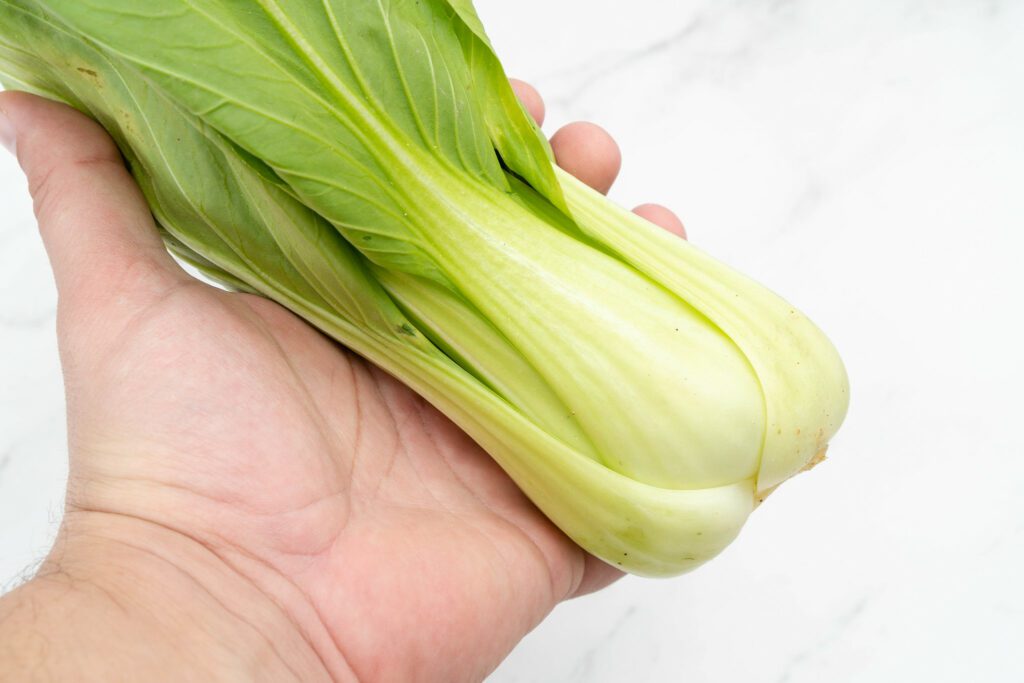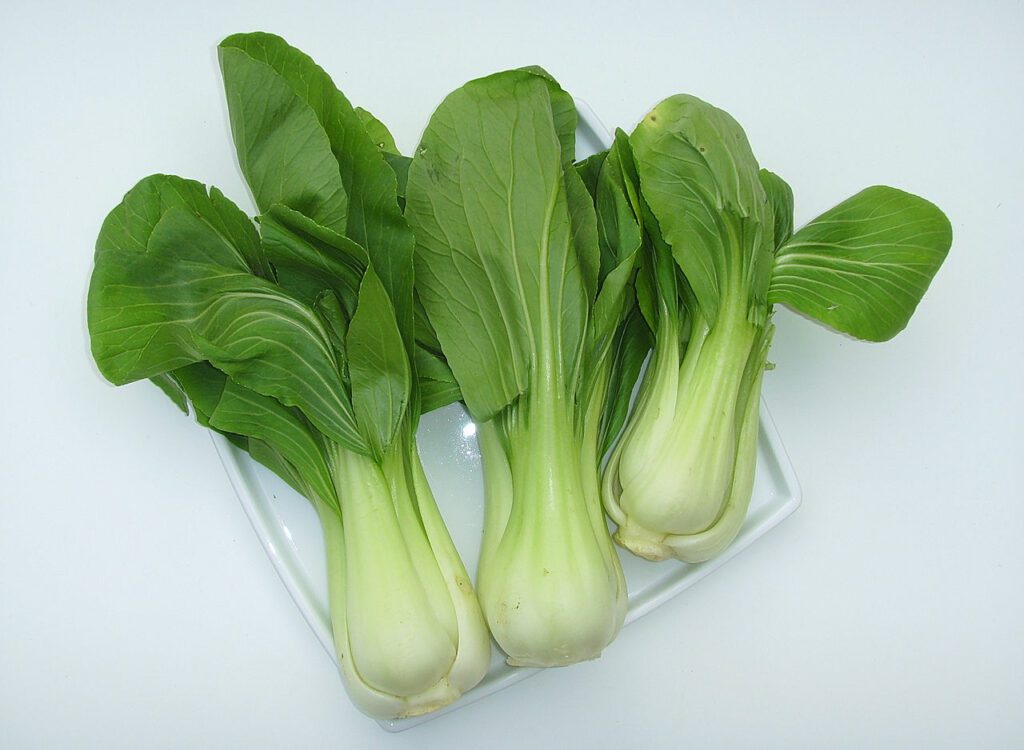Bok choy is a type of Chinese cabbage that has gained popularity worldwide due to its health benefits and delicious taste.
As a dog owner, it’s natural to wonder whether this vegetable can be safely incorporated into your furry friend’s diet.
In this article, we’ll explore whether dogs can eat bok choy, the potential benefits, and risks, and how to serve it to your pup. Keep reading to find out if bok choy is a safe and nutritious addition to your dog’s meal plan.
- Can Dogs Eat Bok Choy?
- How Much Bok Choy Can Dogs Eat?
- How Often Can Dogs Eat Bok Choy
- Health Benefits of Bok Choy To Dogs
- Potential Risks of Feeding Bok Choy To Dogs
- Nutritional Benefits of Bok Choy For Dogs
- Are Dogs Sensitive To Bok Choy?
- How To Prepare Bok Choy For Dogs
- How Fast Will Dogs Digest Bok Choy
- FAQs
- In Conclusion
Can Dogs Eat Bok Choy?

Yes, dogs can eat bok choy! This cruciferous vegetable is high in fiber, magnesium, phosphorus, and vitamin A. It’s a great source of nutrients that are beneficial for your pup’s health.
When feeding bok choy to your dog, it’s important to make sure it is cooked with other types of vegetables that are safe for dogs and not to add any garlic or onions.
Additionally, you should always remember that extra foods should make up no more than 10% of your pup’s daily diet. Too much bok choy can cause gastrointestinal upset in dogs.
If you’re ever unsure about what foods are safe for your pup to eat, it’s best to consult with your veterinarian first.
See also: 47 Safe Vegetables To Feed Your Dog. Puppy Power!
How Much Bok Choy Can Dogs Eat?

As a general rule, vegetables like bok choy should make up no more than 10% of your dog’s daily diet.
This means that if you’re feeding your dog a cup of food per day, no more than a tablespoon of bok choy should be added.
It’s also important to keep in mind that not all dogs will tolerate vegetables in their diet. Some dogs have a more sensitive stomach than others and may not be able to digest certain foods well.
If you’re not sure whether bok choy is a good fit for your dog, it’s best to consult with your veterinarian before incorporating it into their diet.
Bok Choy Feeding Chart According To Size
| Food | Size | Portion |
|---|---|---|
| Bok Choy | Toy dogs | Few slices |
| Bok Choy | Small dogs | Few slices |
| Bok Choy | Medium dogs | Up to 2 ounces |
| Bok Choy | Large Dogs | Up to 4 ounces |
Bok Choy Feeding Chart According To Age
| Food | Age | Portion |
|---|---|---|
| Bok Choy | 0 – 6 months | Don’t feed |
| Bok Choy | 6 – 12 months | Few slices |
| Bok Choy | 12 – 24 months | Up to 2 ounces |
| Bok Choy | 24+ months | Up to 4 ounces |
How Often Can Dogs Eat Bok Choy
It is recommended to give dogs small pieces of bok choy as an occasional treat, rather than a regular part of their diet.
It is important to consult with a veterinarian before adding any new foods to a dog’s diet, including bok choy, to ensure that your dog is not allergic or intolerant to it.
Health Benefits of Bok Choy To Dogs
- Rich in vitamins. Bok choy is a good source of vitamins A, C, and K, which are important for maintaining a healthy immune system, promoting healthy vision, and ensuring proper blood clotting.
- Contains potassium. Potassium is an essential mineral that supports healthy muscle and nerve function and helps regulate fluid balance in the body. Bok choy is a good source of potassium.
- High in fiber. Bok choy is a great source of fiber, which can help regulate digestion, prevent constipation, and promote feelings of fullness, helping dogs maintain a healthy weight.
- Low in calories. Bok choy is a low-calorie vegetable and can be used as an occasional snack or treat for dogs on a diet, as it provides a satisfying crunch without adding many calories.
- Helps boost bone health. Bok choy contains calcium, which is important for maintaining strong bones and teeth in dogs. Calcium plays a crucial role in muscle contraction, nerve conduction, and blood clotting.
Potential Risks of Feeding Bok Choy To Dogs
- Digestive upset. Bok choy can cause digestive issues like bloating, gas, or diarrhea if given in too large of a quantity. Dogs should only be given small pieces as an occasional treat.
- Allergic reactions. Some dogs may be allergic or intolerant to certain foods, including bok choy. It is important to consult with a veterinarian before giving any new foods to your dog.
- Nutritional deficiencies. Bok choy does not contain all the necessary nutrients for a balanced diet for dogs and should not replace other healthy sources of food.
- Oral health problems. The fibers from bok choy can get stuck between teeth and cause dental plaque or periodontal disease if left unchecked, so it is important to provide appropriate oral care after feeding bok choy to your pup.
- Risk of choking or obstruction. Make sure you cut the bok choy into small pieces that are appropriate for your pup’s size and don’t pose a choking hazard. Large chunks could also become lodged in the throat or intestines, leading to an obstruction that may require medical attention.
Nutritional Benefits of Bok Choy For Dogs
| Bok Choy Nutrition Facts per 100 grams | % DV * |
|---|---|
| Calories | 9 |
| Total Fat | 0 g |
| Cholesterol | 0 mg |
| Sugar | 1 g |
| Glycemic Index | 1 |
| Sodium | 46 mg |
| Carbs | 2 g |
| Protein | 1 g |
| Vitamin D | 0% |
| Calcium | 6% |
| Iron | 6% |
| Potassium | 0 mg |
Are Dogs Sensitive To Bok Choy?
Yes, dogs can be sensitive to bok choy. Symptoms of sensitivity may include vomiting, diarrhea, and other gastrointestinal issues.
It is important to feed your dog bok choy in moderation and watch for any signs of discomfort or distress. If your dog does show signs of sensitivity, it is best to stop feeding them bok choy and consult a veterinarian.
Bok choy is a cruciferous vegetable that is high in fiber, magnesium, phosphorus, and vitamin A. It also contains antioxidants which can help boost the immune system and reduce inflammation.
However, some dogs may be allergic to bok choy or have difficulty digesting it due to its high fiber content.
It is important to monitor your dog closely when introducing new foods into its diet. Start by giving them a small piece of cooked bok choy with other vegetables that are safe for dogs and make sure there are no added ingredients like garlic or onions which can be toxic for dogs.
If your pup shows any signs of discomfort after eating bok choy such as vomiting or diarrhea, it’s best to discontinue feeding them this vegetable and consult a veterinarian if necessary.
Overall, bok choy can be a healthy addition to your pup’s diet as long as you take the proper precautions when introducing it into their meals.
Make sure you are aware of any potential allergies or sensitivities they may have before adding this vegetable into their diet so that you can keep them safe and healthy!
How To Prepare Bok Choy For Dogs
- Steamed or boiled. Steam or boil bok choy until it’s soft and let it cool before serving. Make sure it’s cut into small pieces that are easy for your dog to chew and digest.
- Raw. Some dogs enjoy the crunch of raw bok choy. Cut it into bite-sized pieces and serve it as a healthy snack.
- Mixed with other foods. Bok choy can be mixed with other dog-friendly vegetables such as carrots, broccoli, or zucchini to create a healthy and balanced meal. Make sure all the vegetables are cooked and cut into small, bite-sized pieces before mixing.
How Fast Will Dogs Digest Bok Choy
The rate at which dogs digest bok choy can vary depending on a number of factors, including the dog’s age, size, and overall health. However, on average, bok choy will take around 4-6 hours to digest in a healthy adult dog.
It’s important to remember that feeding your dog too much bok choy at once can lead to digestive issues such as bloating or diarrhea, so it’s best to start with small amounts to gauge their tolerance.
Additionally, feeding bok choy in conjunction with a well-balanced and age-appropriate diet can help facilitate digestion and nutrient absorption.
Overall, bok choy can be a healthy and nutritious addition to your dog’s diet when given in moderation and prepared appropriately. If you have any concerns about your dog’s digestion or nutrition, it’s best to consult with a veterinarian for personalized recommendations.
FAQs
Can dogs eat bok choy stems?
Yes, dogs can eat bok choy stems. These crunchy vegetable stems are full of vitamins, minerals, and dietary fiber that can all benefit a pup’s overall health. It is important to cut the stem into small pieces before feeding them to your dog as they may be difficult for them to chew on due to their crunchy texture.
Can dogs eat bok choy leaves?
Yes, dogs can eat bok choy leaves! In fact, this vegetable is a great source of vitamins A, B1, B6, and C. It also contains iron, calcium, and magnesium. Bok choy leaves are also high in dietary fiber which helps keep your dog’s digestive system running smoothly.
Can dogs eat baby bok choy?
Yes, dogs can eat baby bok choy! Baby bok choy is a type of Chinese cabbage that is full of vitamins and minerals such as calcium, potassium, and Vitamin C.
In Conclusion
In conclusion, bok choy can be a healthy and nutritious addition to your dog’s diet when given in moderation and prepared appropriately.
This cruciferous vegetable is rich in vitamins, minerals, and antioxidants that can support a healthy immune system, strong bones, and good digestive health.
However, it is important to feed your dog bok choy in moderation so as not to cause any digestive issues.
As with any food, it’s always best to consult with a veterinarian before adding bok choy or any new food to your dog’s diet, especially if you’re unsure about their sensitivity or tolerance to this vegetable.
With the right preparation and care, bok choy can be a great way to add variety and nutritional value to your furry friend’s diet.





Leave a Reply